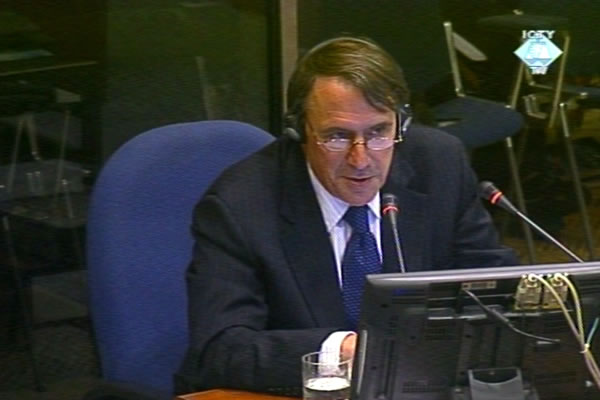Home
GALBRAITH: AUTHORITIES ORDERED OR APPROVED CRIMES
In his evidence at the Gotovina, Cermak and Markac trial, the first US ambassador to Croatia says Tudjman believed that all countries including Croatia had to be ethnically homogenous, seeing Serbs as a ‘threat’ to this ideal. Galbraith then explained why he said there had been no ethnic cleansing in Operation Storm, although there had been crimes, committed ‘either on the orders or with the tacit approval of the Croatian leadership’, in the presence and with the participation of the military
 Peter Galbraith, witness at the Gotovina, Cermak and Markac trial
Peter Galbraith, witness at the Gotovina, Cermak and Markac trial Peter Galbraith served as the US ambassador to Croatia for four and a half years, from mid 1993 to early 1998. In his evidence today at the trial of generals Ante Gotovina, Ivan Cermak and Mladen Markac, indicted for crimes committed during Operation Storm and its aftermath in August 1995, Galbraith spoke of his contacts with Croatian officials at the time, primarily with president Tudjman. Tudmjan is the first on the list of participants in the joint criminal enterprise aimed at permanent removal of Serb population from the Krajina territory; the three accused also feature on the list in the indictment.
He and other US officials had information months before Operation Storm that there would be a military attack on Krajina, Galbraith said. They showed understanding for operations the Croatian Army launched in the Cazin Krajina and Croatian Krajina, especially in light of the massacre in Srebrenica in July 1995 and the Bosnian Serb army attack on Bihac. The US never green-lit the operation, he contends, but because the US administration knew it might be launched, it expressly warned the Croatian authorities and president Tudjman of their obligation to protect the Serb civilians and prisoners of war. The atrocities like those committed in the Medak Pocket in 1993 were not to be repeated.
In the first days after the arrival of the Croatian Army in Knin, Galbraith recounted, the reports of the US embassy personnel indicated there were widespread killings of Serb civilians and destruction of their houses, thus confirming that the situation in the field was exactly what the US administration wanted to prevent. In Galbraith’s opinion, this happened ‘on the orders or with the tacit approval of the Croatian leadership’, in the presence and with the participation of the military.
Regardless of the systematic crimes against Krajina Serbs, Galbraith does not see Operation Storm as ethnic cleansing, mainly because most of the population had already fled when the Croatian army and police arrived. ‘You cannot ethnically cleanse somebody who is no longer there, although it doesn’t mean that the Croatian forces would not have done it if the Serbs had remained there’, he explained. In his view, the RSK authorities are responsible for the Serbs’ departure because they had urged the population to leave. However, defense minister Susak admitted to Galbraith that the Croatian authorities engaged in ‘psychological warfare’ that partly contributed to the exodus, he noted.
When the Serbs left Krajina, the Croatian authorities did everything to prevent them from returning, issuing a decree to confiscate the property of all those who failed to return within thirty days. Furthermore, their houses were destroyed and their return obstructed in various ways. According to Galbraith, this fit Tudjman’s idea of an ethnically homogenous Croatia. Whenever they met, the president would emphasize that every country should be ethnically homogenous, adding that local Serbs posed a ‘threat’ to the homogeneity of the Croatian state. ‘He was not ashamed of his views and I wondered how he could imagine that an American would accept his reasoning’, Galbraith stated, noting that the Croatian president spoke ‘favorably’ of the so-called humane transfer of population. Tudjman’s attitude towards Muslims was racist and he advocated the division of BH which would lead to the creation of a Greater Croatia, Galbraith concluded.
Peter Galbraith has so far given evidence before the Tribunal about his ambassadorship in Croatia at the trial of Slobodan Milosevic, former Serbian president, that of Milan Martic, former president of the so-called Republika Srpska Krajina and of Jadranko Prlic and five other former Herceg Bosna officials.
Linked Reports
- Case : Gotovina et al. - "Operation Storm"
- 2008-06-17 PROSECUTOR: CROATIA HAS NOT DELIVERED OPERATION STORM DOCUMENTS
- 2008-06-12 LIVING PYRE IN THE VILLAGE OF DJURICI
- 2008-06-10 ‘BRIGANDS’ LOOTED KRAJINA UNHINDERED
- 2008-06-24 WHAT MADE TUDJMAN HAPPY
- 2008-06-25 GALBRAITH: 'WE TWISTED TUDJMAN'S ARM'
- 2008-06-26 SARINIC: ‘REFUGEES MUST NOT RETURN’
